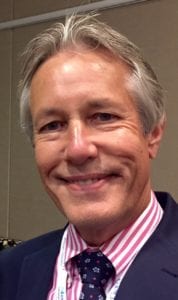With the launch of our new website, we’ve decided to spotlight each of the WVLDI Board Members so you can get to know your leadership better! Check back regularly for more spotlights on WVLDI Board Members and other veterinarians who inspire!
 Spotlight: WVLDI Treasurer Dr. Doug Aspros
Spotlight: WVLDI Treasurer Dr. Doug Aspros
Like so many others, I always wanted to be a veterinarian. I was fascinated with animals, although I never had a pet larger than a hamster and didn’t know anyone who actually was a veterinarian. I had, however, read a novel about a young veterinarian battling FMD in Saskatchewan and found it terribly exciting.
Cornell was about the only choice for a New York resident in those days, and I applied to Cornell as an undergraduate, majoring in biology. Large animal experience was mandatory, and I spent two summers and weekends working on dairy farms where the animals were way larger than my hamsters but just as nice to work with. All the rest of my animal experience came after I was admitted to the Cornell Veterinary College program; I worked all four years in a USDA laboratory studying zinc nutrition in rats (and dairy cows).
I expected to continue in research and apply for PhD programs but, instead, opted for a stint in companion animal medicine first. It turned into a career. General practice was interesting, challenging and offered some real emotional benefits, both from clients and patients.
I bought a practice in Westchester County and worked seven days a week. Nevertheless, I was restless enough to look outside the office for other professional activities. I was president of my local association, started a group-owned emergency practice and was appointed to the Board of Health.
Not being challenged enough by two children and three practices, I served on the board and then as president of the NYSVMS. A term on the Cornell Advisory Council lead to a run for a six-year term on the Council on Education and accrediting both new and existing programs in the US, Canada, Europe and Australasia. I served on the National Board of Veterinary Medical Examiners (we were responsible for the NAVLE), and after my term wrote questions for the examination.
I was elected by the members to represent District 1 on the AVMA Executive Board, and then by the House of Delegates to serve as President of the AVMA 2012-13.
I am still a practice owner, as a co-owner of the Pound Ridge Veterinary Center; in addition, the Strategic Advisor for Partnership Development at Veterinary Practice Partners.
On the volunteer side, I am currently president of the Pet Nutrition Alliance, still a member of the Westchester County Board of Health, a member of the New York State Board for Veterinary Medicine, and a Trustee of the AVMA-PLIT.
I have been concerned about the structural and cultural impediments to women occupying leadership positions in our profession since I first was admitted to Cornell. At USDA I worked under a terrific women scientist; both my high school and undergraduate classes were solidly co-educational – despite being science oriented. The CVM at Cornell was pointedly not friendly to women (or to diversity in general) when I was a student in the 1970s. The top leadership at AVMA was still all-male when I started there in 2006 and, despite a membership that was becoming rapidly feminized, reluctant accept the need to change.
Karen Bradley’s being voted off the House Advisory Committee was the breaking point for me and, when she and Stacy Pritt planned to start an organization to challenge that culture and prepare and promote women into leadership roles in the veterinary profession, I was ready to help.
My undergraduate roommate’s family had a farm house in northern Massachusetts; each January we’d use it as a base for a ski holiday. The mantelpiece in that house carried a quote from Oliver Wendell Holmes that has stayed with me, and it sums up why I’ve spent so much of my time stepping up:
“I think that, as life is action and passion, it is required of a man that he should share the passion and action of his time at peril of being judged not to have lived.”
Veterinary medicine has been resistant to change – it’s a conservative profession. If we’re to thrive in the future, we need leaders who understand and can support a new generation of graduates. Our institutions need to adapt, attract and support those leaders – and that’s where the WVLDI mission finds the intersection of what I personally believe and what the profession needs. And I think at WVLDI we’re making a difference.

